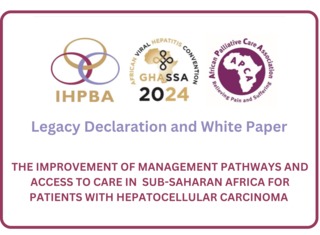International Hepato-Pancreato-Biliary Association
IHPBA 2024 Legacy Declaration: The improvement of management pathways and access to care in sub-Saharan Africa for patients with Hepatocellular Carcinoma

The International Hepato-Pancreato-Biliary Association (IHPBA) united with the African Viral Hepatitis Convention (AVHC), and the African Palliative Care Association (APCA) in Cape Town, to issue the Legacy Declaration on "the improvement of management pathways and access to care in sub-Saharan Africa for patients with Hepatocellular Carcinoma".
The declaration highlights alarming statistics, such as the region having the world's highest incidence rates of HCC and a median survival of only 2.5 months post-diagnosis. It calls for urgent action to address chronic viral hepatitis, a major cause of HCC, and improve vaccination, diagnosis, and treatment access.
Key recommendations include:
Introducing Hepatitis B Birth Dose Vaccination: To prevent mother-to-child transmission, countries are urged to include monovalent hepatitis B birth dose vaccination in their immunization programs.
Enhancing Hepatitis B Vaccination Coverage: Strengthening national immunization programs to achieve 90% coverage.
Improving Linkages to Care: Providing antiviral treatments for those with chronic hepatitis B and C infections.
Establishing Screening Programs: Implementing early diagnosis and surveillance for at-risk populations to allow for curative treatments.
Expanding Treatment Capacity: Increasing resources for systemic therapies and palliative care to improve patient outcomes.
Supporting this declaration is a comprehensive white paper titled "The Improvement of Management Pathways and Access to Care in Sub-Saharan Africa for Patients with Hepatocellular Carcinoma."
This document provides an in-depth analysis of the challenges and solutions for HCC in the region. Authored by experts including Eduard Jonas, Martin Smith, Chris Kassianides, Emmanuel Luyirika, and Wendy Spearman, the white paper outlines several critical points:
Epidemiology and Risk Factors: Chronic HBV infection, dietary aflatoxin exposure, and limited healthcare infrastructure contribute significantly to HCC in sub-Saharan Africa.
Prevention Strategies: Emphasizing primary, secondary, and tertiary prevention through vaccination, screening, and post-treatment surveillance.
Multidisciplinary Approach: Advocating for a comprehensive approach involving hepatologists, pathologists, radiologists, oncologists, surgeons, and palliative care specialists.
The white paper underscores the need for a concerted effort from healthcare providers, policymakers, advocacy groups, and industry partners to address these challenges and improve outcomes for HCC patients in Sub-Saharan Africa.
IHPBA is proud to be part of this vital initiative and is committed to driving progress in the identified areas to enhance patient care and outcomes.
Corporate Partners
If you are interested in becoming a Corporate Partner of the IHBPA please contact industry@ihpba.org
Find out more


